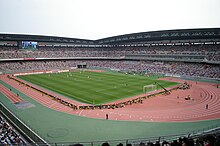
Back ملعب يوكوهاما الدولي Arabic ستاد يوكوهاما الدولى ARZ یوکوهاما میلتلر آراسی ایستادیومو AZB Stadion Internasional Yokohama BAN নিসান স্টেডিয়াম (ইয়োকোহামা) Bengali/Bangla Estadi Internacional de Yokohama Catalan Nissan Stadium Czech Nissan Stadion Danish Nissan-Stadion German Estadio Nissan Spanish
35°30′36.14″N 139°36′22.50″E / 35.5100389°N 139.6062500°E
 The stadium in 2020 | |
 | |
| Full name | Nissan Stadium |
|---|---|
| Former names | International Stadium Yokohama (1998–2005) |
| Location | Shin-Yokohama Park 3302-5 Kozukue-cho, Yokohama, Kanagawa Prefecture, Japan |
| Public transit | JR Central: JR East: JH Yokohama Line at Kozukue Yokohama Municipal Subway: |
| Owner | Yokohama City |
| Operator | Yokohama Sports Association, Yokohama F. Marinos |
| Capacity | 72,327[1] |
| Field size | 107 m x 72 m[1] |
| Surface | Grass[1] |
| Construction | |
| Opened | 1 March 1998 |
| Construction cost | ¥60.3 billion |
| Tenants | |
| Yokohama F. Marinos (1999–present) Yokohama Eagles (2022–present) Japan national football team | |

Nissan Stadium (日産スタジアム, Nissan Sutajiamu), a.k.a. the International Stadium Yokohama (横浜国際総合競技場, Yokohama Kokusai Sōgō Kyōgi-jō), is a multi-purpose stadium in Yokohama, Kanagawa Prefecture, Japan, which opened in March 1998. It is the home stadium of Yokohama F. Marinos of the J1 League.
International Stadium Yokohama had the highest seating capacity of any stadium in Japan for 21 years, with a total of 75,000 seats, up until the New National Stadium in Tokyo was opened in December 2019.[1] It hosted three group stage games during the 2002 FIFA World Cup, and the final game between Germany and Brazil was played there on 30 June 2002. The stadium was one of the football venues for the 2020 Summer Olympics.[2] The stadium was a venue for the 2019 Rugby World Cup and eventually hosted the final of the tournament after the originally selected host, National Stadium was unable to be constructed in time.[3]
On 28 August 2009, Nissan Motors announced that they would not renew the contract for the naming rights of the stadium, which expired on 28 February 2010.[4] But negotiations continued with the city, and a new agreement for three more years was completed. On 28 February 2013, Yokohama City as the stadium's owner renewed the contract for 3 years from 1 March 2013 until 29 February 2016 in a deal worth 150 million yen a year.[5] On 1 December 2015, Yokohama City renewed the contract for 5 years from 1 March 2016 until 28 February 2021 in another deal worth 150 million yen a year.[6] On 26 February 2021, Yokohama City renewed the contract for another 5 years from 1 March 2021 to 28 February 2026 in a deal worth 600 million yen (120 million yen per year).[7]
- ^ a b c d "nissan-stadium.jp – Overview of the facility". Archived from the original on 28 November 2010. Retrieved 28 April 2015.
- ^ "Venue Plan". Tokyo 2020 Bid Committee. Archived from the original on 27 July 2013. Retrieved 11 September 2013.
- ^ "Yokohama Stadium to host 2019 Rugby World Cup Final". The Guardian. 28 September 2015. Archived from the original on 23 June 2018. Retrieved 19 October 2015.
- ^ 「日産スタジアム」の命名権、更新見送り Archived 2 November 2009 at the Wayback Machine Nikkei Net, 29 August 2009 (Japanese)
- ^ Yokohama City official announcement Archived 26 March 2016 at the Wayback Machine (in Japanese)
- ^ Yokohama City official announcement Archived 4 April 2016 at the Wayback Machine (in Japanese)
- ^ "「日産スタジアム」継続へ 横浜市と5年、6億円で契約更新". Archived from the original on 29 October 2021. Retrieved 12 October 2021.